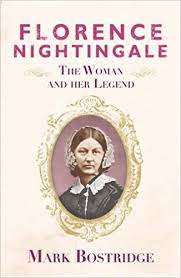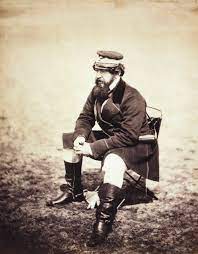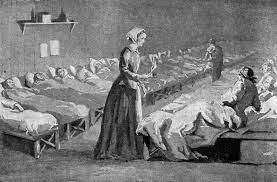GoodReads meta-data is 629 pages, rated 3.80 by 164 litizens.
Genre: Biography.
Verdict: Wonder Woman!
Every scrap of paper she ever wrote remains, or so it seems, and it overwhelms a biographer. Her dates were 1820 – 1910.

No lamp and not a nurse. Got it! What she was was a public administrator. Not a fashionable title these days but that it what she was.
The woman in the girl is plainly visible with her systematic approach to everything, her appetite for work, her linguistic ability, her packrat saving of any and everything, her mulish determination to see things through, her industrial strength letter writing, and so on and on. How different she was from her sister though both had a virtually identical upbringing. This difference is something the two sisters discussed themselves more than once, when her sister could be bothered to be serious for a moment.
To illustrate both the differences in the girls and Florence’s nature, consider this. The girls would attend an opera, and while there Sister would flirt with men, strike poses, and laugh to attract attention to herself. Meanwhile, young Florence would be writing notes about the music, costumes, and singing because she was keeping a spreadsheet (avant le mot) of her taste in music, trying to work out what she liked and why she liked it. Ever the analyst she was always on duty. Even at this age she felt she had some sort of calling. She does much talking to god through the pages (and pages).
In the Victorian era her choices were limited. Stay at home…forever with her parents. Or, marry a house, well, a husband, but then work the house. To illustrate one suitor with whom she well matched intellectually and morally she rejected because she feared the closeted life marriage would entail. He married another, and in the first month this new wife hosted more than twenty dinner parties, three receptions, and five open house breakfasts. He was wealthy and had political ambitions, networking constantly. A new wife gave him an excuse to entertain non-stop, and no doubt the pace slackened later, but it indicates what the matrimonial deal was. This man would have accepted Nightingale’s other activities as long as they took second place to management of the house, the servants, the suppliers, the guest lists, the seating charts, the budget, the soirees, the children,….and so on.
Her search for a vocation that would be pleasing to her, and to god, and acceptable to her parents went on for years, and years, and years. There were several false starts toward nursing. That answered to her feeling of service and philanthropy, but nursing at the time was little more than a sickroom maid. There was no training, no qualification, and if anything the social status was lower than a lady’s maid. Use your imagination and figure that out. She was intrigued by the Kaiserwerth Institution in Germany, but her efforts to find out more took several years, but she went there for three months and it inspired her. Nurses were trained there in hygiene, sanitation, basic medical procedures like taking pulse, testing reflexes, and measuring blood pressure, and applying external salves, cleaning wounds, bandaging, and so on. They wore uniforms and there was an authority structure by seniority. A premium was on order, system, and cleanliness. Exact records were kept. This all appealed to her and she set about importing it to England. Another uphill struggle. Her campaign then, as later, was mostly by letter writing.
She got a chance, at last, to practice what she preached when hired to run a genteel ladies hospital. Genteel meant middle class, usually retired and impoverished governesses, and Protestant (not Catholic, not Jewish…). She only took the job on condition she could broaden the intake, and run it the way she wanted as long as it stayed within budget. One of his first acts was to save money by dismissing the resident protestant clergyman who had been treating the patients as a captive audience for his proselytising. Every step she took was contested but she was made of stern stuff and felt the divine hand was now on her shoulder. She introduced those new fangled Teutonic ideas and that was also resisted root-and-branch.
She learned to manipulate the management committee and that experience stood her in good stead later. She no longer went at things headfirst, but planted seeds with this member or that, and let them think it was their own idea, and voilà.
The Crimean War was the first major conflict since Napoleon in 1815 and the British Army was woefully unprepared in every way. But needs must. Stiff upper lip, and so on. Situation normal, all fouled up. But then that journalist William Russell sent in his reports, and the appalling condition of the army, including the sick, wounded, and dying was there in black-and-white. Needless to say the first reaction from Whitehall was to blacken his name, after all he was Irish, and so by definition an unreliable troublemaker. Denial, first. Then discredit. Next dissimulate. All of this was and is normal damage control.
However to its credit the Times of London which employed him and printed his dispatches stood by him, as did the photographs he got. Then they played musical chairs in Whitehall and a new minister did many things, but most of all he recognised Nightingale. That was to save many lives in the immediate future and set in train a great many changes.

Coincidentally, Nightingale had written a petition in response to Russell’s report, volunteering to go to Turkey at her own expense and superintend one of the hospitals. That letter crossed one from the new minister offering her an official role so within five days she was on a ship for the Bosporus. Whirlwind indeed. What she found was even worse than Russell reported, since he was restrained in the interest of not putting off readers.
Comes the hour, comes the man, is an Italian adage I once heard, and it applies here. She was the person for the job and this was her hour. In the mayhem and chaos she cut through incompetence, carelessness, corruption, resignation, dishonesty, confusion, miasma, and worse to achieve order, system, and regularity. She soon made the minister who commissioned her sorry he had by her barrage of requests and demands, all couched ever so politely and all implicitly backed up the threat of publicity from Russell if the response was unsatisfactory. She worked twenty-hours a day for the first few weeks, dismissing incompetents, paying herself for some necessary equipment like mops to clean up the blood, instructing those willing to learn in the basics, writing her letters to London, and on and on. She threw herself into as her life’s work all at once.
She herself did very little nursing and never carried that famous lamp. That was a hagiographic embellishment for public relations. She did do rounds, sometimes at night, to double check on things. While the army lurched from one disaster to another, her’s become the only good news from the campaign and so got pride of place, and that gave her ever more leverage, and she used it.
It should be noted by the way that the hospitals she managed were all devoted to the rank and file and not to the officers. These grunts were the brutes and ruffians commanded by the toffs in the language of the day. The social distance between officers and men was measured in light years. That she solicited the welfare of working class dregs who ended up in the army was often part of the prejudice against her by the toffs and their kind, while making her very popular with that majority.
The conflicts within the medical service were many as were those between the medical service and rest of the army and with Treasury back in London. Nightingale had an unending struggle with just about everyone and their cousins. To give a reader some idea of what it was like. The society ladies and wives of officers who volunteered thought they should have separate and better quarters and food. Among others there were conflicts over authority, social status, and religion that only she could resolve, and each time she did the loser fired off an angry letter to The Times and to the Treasury.

Or another example about the Treasury which oversaw the expenses she claimed. Treasury refused to pay for new shirts for those wounded and sick soldiers admitted to the hospital because it is a soldier’s responsibility to look after his kit. Men who arrived in bloodied and torn shirts after being hit by cannon fired shrapnel were denied a change of clothing; she lost this war of words and paid for the shirts herself.
The Protestant nurses suspected the Catholic nurses of soliciting deathbed conversions to Catholicism and vice versa. Meanwhile, Nightingale would not have a clergyman of any kind in the wards to proselytise and that offended them both. And so on and on. Every pinhead was fought over by the pinheads.
She got a lot of hagiography, true, but the only spurred the trolls on to ever more venom. Her public image was two parts angel and one part devil. Her parents who had disapproved of her mission and her annoying and egotistical sister took up the cudgels on her behalf, as did many cousins, aunts, nephews, and nieces from the extended clan. Even Queen Victoria weighed in with a medal.
Her fame attracted many volunteer nurses who wanted a share of the limelight, an oriental adventure, a change of scene, a spot of husband hunting among the officers, and she was lumbered with a great many such dilettantes and it was impolitic to send them all packing. These volunteers arrived unannounced but all with letters from someone important. Some of the society ladies who arrived would not enter a ward when they discovered it stank, was full of working class men, had vermin, and was noisey. Carrying a bedpan was out! Mopping a floor, no way! One such volunteer came with her own maids to do all the heavy lifting, while she graced the proceedings, she thought. That lasted just over a day.
Is it any wonder that Nightingale lost weight, lost appetite, developed anaemia, and caught every disease floating around so that she became a semi-invalid. That added to her angelic halo for some and trolls supposed she was faking. Think of Pucker-Up on Pox News. Some things never change. The years she spend in the Crimean War must have seemed like centuries. The author is very good at laying out and explaining the debilitating illness that Nightingale developed after leaving the Crimea. He is also excellent on her efforts to influence (without seeming to do so) a postwar royal commission into army reform with her revolutionary ideas, mopping the floor, not building a barracks over cesspits, changing bandaging, and so on. These were shocking and revolutionary ideas to the Army Medical Service. Needless to say the army resisted all such recommendations. Needless to say she persisted and overcame with enormous effort.
In her steady efforts to reform the British Army she also pursued other reforms in her spare time! When conflict with the USA loomed and the government wanted to increase its army strength in Canada, she was consulted and threw herself into the project for a month or so, poring over maps, interviewing by letter travellers returned from Upper Canada, reading weather reports from army posts, assessing the thermal properties of wool blankets versus buffalo robes, estimating the effects of exposure to the weather on marching troops, calculating the food needed to sustain a regiment in a winter, and so on. Like a barrister on a large and complex legal case, she assembled, mastered, and ordered a mass of material for a report, but the storm passed and it was not needed.
Later when in a massive change the East India Company Army in India was integrated into the British Army she was called upon again, and applied the same vigour and methods to determining the needs of this newly organised force for sanitation, diet, exercise, and this report was completed, accepted, and implemented without her name attached to it per her preference.
By the way, her inquires about India brought her into contact with Indian nationalists, and she became, albeit, in a low key and advocate of home rule for India. More letters!
She burned the candle at both ends, despite the bacterial infection that persisted in the absence of antibiotics and made her bedridden for much of her life thereafter the pain from which changed her personality. She became ever more imperious, short-tempered, impatient, and uncompromising. She herself suffered, at times her weight would balloon up and at other times she would waste away. In hindsight that fluctuation came from the disease’s ravages on her system, but at the time it was incomprehensible, and all the more frightening for it. Despite her own aliments, or perhaps because of them, she worked at least two of her acolytes to death quite literally. Least a reader think this is an exaggeration, she wrote to one who was on his deathbed to say she was disappointed he had not done more! No lady with the lamp there.
The irony is that it took a long, long time for her to accept that germs led to contagion, sticking to the miasmatic theory for decades, despite the mounting evidence from her own statistical research, though she finally did accept it.
The book proceeds in detail which I can no longer summarise. Suffice it to say she was one of a kind, and we are the poorer for that, by which I mean we could benefit from more of her kind. We need more public administrators who try to get things right, and leave the headlines to those who cannot do anything else.
By the way she was born in Florence Italy when her parents were on a grand tour, hence the name.

The stimulus to read a biography of Florence Nightingale was a BBC Radio4 episode of ‘Great Lives’ (highly recommended to eggheads) about her, featuring this biographer. It included the only remaining voice recording of the woman herself. I was surprised and enlightened by that brief, albeit superficial, discussion and went looking for the book. Glad I did.
We visited the small nursing museum at the old Sydney Hospital a few years ago and it featured a display on Nightingale Nurses, and that stuck in mind, too. On a visit to Istanbul in 2015 we saw the site of Scutari from a ferry, but had not time to visit it.

